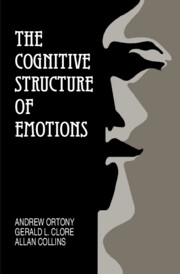Book contents
- Frontmatter
- Contents
- Preface
- 1 Introduction
- 2 The Structure of the Theory
- 3 The Cognitive Psychology of Appraisal
- 4 Factors Affecting the Intensity of Emotions
- 5 Reactions to Events: I
- 6 Reactions to Events: II
- 7 Reactions to Agents
- 8 Reactions to Objects
- 9 The Boundaries of the Theory
- References
- Author Index
- Subject Index
8 - Reactions to Objects
Published online by Cambridge University Press: 01 June 2011
- Frontmatter
- Contents
- Preface
- 1 Introduction
- 2 The Structure of the Theory
- 3 The Cognitive Psychology of Appraisal
- 4 Factors Affecting the Intensity of Emotions
- 5 Reactions to Events: I
- 6 Reactions to Events: II
- 7 Reactions to Agents
- 8 Reactions to Objects
- 9 The Boundaries of the Theory
- References
- Author Index
- Subject Index
Summary
Having offered a fairly detailed analysis of the different emotions that arise when people react to events and to the actions of agents, we are left with the final major group of emotions, those resulting from reacting to objects or aspects of objects. While the structure of this group is quite simple–there being only one positive and one negative emotion type–in reality, these emotions are among the most complex of human reactions. The Attraction emotions are rooted in evaluations of appealingness, which in turn are based on attitudes. In this context, the notion of an attitude has to be treated sufficiently broadly to include tastes as well.
The Attraction Emotions
The Attraction emotions are momentary reactions of liking and disliking, and as such, they are among the most salient experiences we have. At the same time, they appear to be more immediate, more spontaneous, and less affected by accessible cognitive processes than almost all of the other emotions. The foundations upon which they are built–attitudes–do not all readily lend themselves to detailed analysis, although it is possible to identify some factors that affect them. The other emotions we have discussed are cognitively differentiated forms of more basic and undifferentiated affective reactions. They achieve their distinctiveness by virtue of these cognitive constraints. Thus, the Prospect-based emotions are reactions to the prospect of events, the Fortunes-of-others emotions are concerned with people's reactions to events as they affect other people, and so on.
Information
- Type
- Chapter
- Information
- The Cognitive Structure of Emotions , pp. 156 - 171Publisher: Cambridge University PressPrint publication year: 1988
